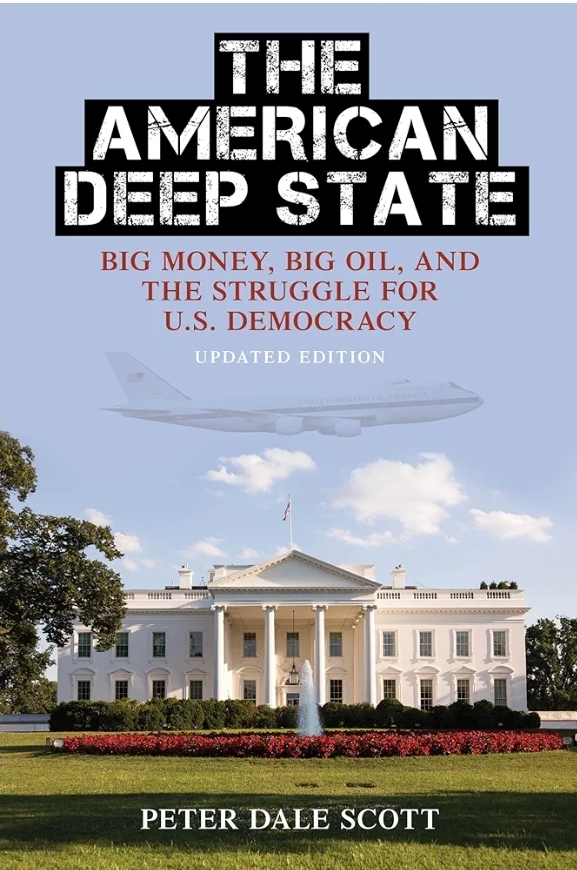“The American Deep State: Big Money, Big Oil, and the Struggle for U.S. Democracy” is a thought-provoking exploration by Peter Dale Scott, a former Canadian diplomat, professor, and prominent political analyst known for his concept of “deep politics.” In this book, Scott delves into the hidden networks of power that operate behind the scenes in American politics, which he collectively refers to as the “deep state.” He argues that this shadowy network of corporate interests, intelligence agencies, military factions, and financial elites has a profound influence on U.S. domestic and foreign policy, often overriding democratic processes and public accountability.
Key Themes and Arguments:
- The Concept of the Deep State:
- Scott defines the “deep state” as a covert, interconnected power structure that exists beneath the visible democratic framework of the United States. This structure includes not only government entities like the CIA, FBI, and NSA, but also non-governmental actors such as major corporations, banks, defense contractors, and influential think tanks.
- He posits that these elements work together to maintain control over U.S. policy, often bypassing or subverting democratic institutions to protect their own interests. The deep state, according to Scott, operates through a combination of legal and illegal methods, from lobbying and campaign contributions to covert operations and disinformation.
- Historical Origins and Evolution:
- Scott traces the origins of the deep state to the post-World War II era, particularly the establishment of the national security state following the National Security Act of 1947. This act created the CIA, the National Security Council (NSC), and other institutions that would form the backbone of the American intelligence community.
- He argues that the Cold War provided a justification for the expansion of clandestine operations and the centralization of power within the executive branch, paving the way for the deep state’s growth. Over time, the deep state evolved to include private-sector actors such as defense contractors, oil companies, and financial institutions that wield significant influence over U.S. policy.
- Big Money and Big Oil:
- Scott highlights the critical role of “Big Money” and “Big Oil” in the deep state. He describes how large multinational corporations, especially in the energy sector, have historically shaped U.S. foreign policy to secure access to global resources.
- He points to instances where oil companies and financial institutions have driven U.S. interventions abroad, such as in the Middle East, Latin America, and Africa. He argues that these entities work in tandem with the CIA and the military to maintain control over resources, often destabilizing regions and supporting authoritarian regimes to protect their interests.
- The Role of Intelligence and Security Agencies:
- Scott delves into the activities of U.S. intelligence and security agencies, which he describes as the operational arm of the deep state. He provides numerous examples of covert operations, assassinations, regime changes, and domestic surveillance programs carried out by the CIA, FBI, and NSA.
- He suggests that these agencies have not only interfered in foreign governments but have also targeted American citizens and institutions to suppress dissent and protect the interests of the deep state. He cites the surveillance of civil rights activists, anti-war protesters, and political dissidents as examples of domestic overreach.
- The Military-Industrial Complex:
- The book examines the military-industrial complex as a key component of the deep state. Scott argues that defense contractors, arms manufacturers, and military leaders have a vested interest in perpetuating conflicts and maintaining a high level of military spending.
- He contends that this complex has been instrumental in shaping U.S. foreign policy decisions, from the Vietnam War to the War on Terror, by lobbying for policies that ensure continued demand for military goods and services. This has led to a cycle of endless war, which benefits the deep state at the expense of democratic oversight and public welfare.
- The Financial Sector’s Influence:
- Scott discusses the powerful influence of the financial sector, particularly Wall Street banks and investment firms, on the deep state. He highlights how these institutions have shaped U.S. economic policy to serve their interests, often at the expense of broader economic stability.
- He argues that financial elites have used their influence to secure bailouts, deregulate markets, and implement austerity measures that benefit the wealthy while undermining social safety nets. The 2008 financial crisis is presented as a prime example of how the deep state protects its own, even in the face of public outrage and economic collapse.
- The Threat to U.S. Democracy:
- Scott warns that the deep state’s activities represent a fundamental threat to American democracy. He argues that the deep state’s unchecked power and lack of accountability undermine the democratic process, erode civil liberties, and create a climate of fear and distrust.
- He contends that the deep state’s influence has led to a gradual erosion of constitutional protections, including the right to privacy, freedom of the press, and the right to dissent. He argues that the deep state’s actions have created a “permanent war state” that prioritizes military and intelligence interests over the needs and rights of citizens.
- The Struggle for Accountability and Reform:
- Scott emphasizes the need for greater transparency and accountability in government to counter the power of the deep state. He calls for reforms to limit the influence of money in politics, increase oversight of intelligence and security agencies, and protect civil liberties.
- He advocates for a more informed and engaged citizenry that can challenge the deep state’s power by demanding greater accountability from elected officials and government institutions. He also suggests that international cooperation and solidarity are crucial to combating the global reach of the deep state.
“The American Deep State: Big Money, Big Oil, and the Struggle for U.S. Democracy” offers a critical examination of the hidden power structures that shape American politics. Peter Dale Scott’s analysis provides a sobering look at how corporate interests, intelligence agencies, and financial elites manipulate U.S. policy, often at the expense of democratic principles and public welfare. While some may view Scott’s conclusions as controversial or conspiratorial, his work raises important questions about the nature of power in the United States and the need for greater transparency, accountability, and democratic engagement.
Scott’s book challenges readers to consider the existence of a deep state and its impact on American democracy. It serves as a call to action for those concerned about the erosion of democratic norms and the unchecked power of hidden forces operating behind the scenes.






